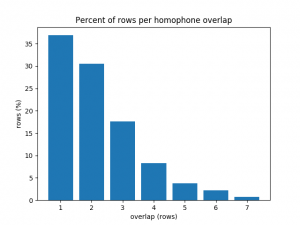Dictionary of Frequently-Used Taiwan Minnan/Monosyllables: Difference between revisions
No edit summary |
mNo edit summary |
||
| (13 intermediate revisions by the same user not shown) | |||
| Line 1: | Line 1: | ||
A monosyllable is a word with only one syllable. We found almost 3,000 monosyllable words in the ''[[Dictionary of Frequently-Used Taiwan Minnan]]'' (''MoeDict''), having 1,800 distinct sounds. Here is a [[ | A [[monosyllable]] is a word with only one syllable. We found almost 3,000 monosyllable words in the ''[[Dictionary of Frequently-Used Taiwan Minnan]]'' (''MoeDict''), having 1,800 distinct sounds. Here is a [[Media:MTL examples for each final.pdf|chart (PDF)]] of all the sounds organized by [[List of all initial consonants in MTL|initial consonant]] and [[Table of all MLT finals|final part]]. | ||
== Analysis == | == Analysis == | ||
We isolated 2,936 rows from the dictionary that are monosyllables and converted their | We isolated 2,936 rows from the dictionary that are monosyllables and converted their romanization to MTL. We only considered words from the first section of the dictionary because they appear to be frequently used, and ignored the second section. We folded in [[Dictionary of Frequently-Used Taiwan Minnan/Words beginning with double hyphen|the backquoted words]], for example ''{{x|`lie}}'' was counted as ''{{x|lix}}''. Then we used Python's collections.Counter to count the frequency of each sound. This yielded 1,800 distinct sounds. | ||
We went further and used Counter again on those results to find out how common homophones are among the monosyllables, and discovered that 63% of rows are homophonic. Those 1853 rows are distributed as follows: | We went further and used Counter again on those results to find out how common homophones are among the monosyllables, and discovered that 63% of rows are homophonic. Those 1853 rows are distributed as follows: | ||
| Line 11: | Line 11: | ||
* the most homophonic sounds are: ''{{x|lie}}'', ''{{x|ky}}'', and ''{{x|køf}}'', which match 7 rows each, followed by ''{{x|cie}}'', ''{{x|kafn}}'', ''{{x|kefng}}'', ''{{x|sefng}}'', ''{{x|kaf}}'', ''{{x|kaq}}'', ''{{x|zngf}}'', ''{{x|ti}}'', ''{{x|sw}}'', ''{{x|leeng}}'', and ''{{x|kerng}}'', which match 6 rows each | * the most homophonic sounds are: ''{{x|lie}}'', ''{{x|ky}}'', and ''{{x|køf}}'', which match 7 rows each, followed by ''{{x|cie}}'', ''{{x|kafn}}'', ''{{x|kefng}}'', ''{{x|sefng}}'', ''{{x|kaf}}'', ''{{x|kaq}}'', ''{{x|zngf}}'', ''{{x|ti}}'', ''{{x|sw}}'', ''{{x|leeng}}'', and ''{{x|kerng}}'', which match 6 rows each | ||
* about 37% of rows are not homophonic (1,083 rows:1,083 sounds), using 60% of the sound set | * about 37% of rows are not homophonic (1,083 rows:1,083 sounds), using 60% of the sound set | ||
== Trivia == | == Trivia == | ||
The frequently-used monosyllables use 258 [[Table of all finals | The frequently-used monosyllables use 258 [[Table of all MLT finals|MTL finals]], and 154 finals are also words on their own. The polysyllables use 266 finals, or eight more: ''mh'', ''mm'', ''oaai'', ''oai'', ''vaai'', ''vau'', ''vo'', ''vuix'', which belong to the following nine syllables: ''{{x|gvau}}'', ''{{x|gvo}}'', ''{{x|hmh}}'', ''{{x|hmm}}'', ''{{x|hoaai}}'', ''{{x|hoai}}'', ''{{x|khvuix}}'', ''{{x|kvaai}}'', ''{{x|mm}}''. They are used in these words, for example: ''{{x|liengvau}}'', ''{{x|bøgigvo}}'', ''{{x|hmqhmh}}'', ''{{x|hm'afzhao}}'', ''{{x|hoaisafn}}'', ''{{x|phørhoai}}'', ''{{x|khvuie'oah}}'', ''{{x|perng-peqkvaai}}'', ''{{x|hoe'mm}}''. | ||
== See also == | == See also == | ||
* [[ | * [[Dictionary of Frequently-Used Taiwan Minnan/Frequency of syllables|Frequency of syllables]] | ||
* [[ | * [[Dictionary of Frequently-Used Taiwan Minnan/Words beginning with double hyphen|Words beginning with double hyphen]] | ||
* [[Frequently-used Taiwanese polysyllable homophones]] | * [[Dictionary of Frequently-Used Taiwan Minnan/Polysyllable homophones|Frequently-used Taiwanese polysyllable homophones]] | ||
Revision as of 07:42, 4 April 2024
A monosyllable is a word with only one syllable. We found almost 3,000 monosyllable words in the Dictionary of Frequently-Used Taiwan Minnan (MoeDict), having 1,800 distinct sounds. Here is a chart (PDF) of all the sounds organized by initial consonant and final part.
Analysis
We isolated 2,936 rows from the dictionary that are monosyllables and converted their romanization to MTL. We only considered words from the first section of the dictionary because they appear to be frequently used, and ignored the second section. We folded in the backquoted words, for example `lie was counted as lix. Then we used Python's collections.Counter to count the frequency of each sound. This yielded 1,800 distinct sounds.
We went further and used Counter again on those results to find out how common homophones are among the monosyllables, and discovered that 63% of rows are homophonic. Those 1853 rows are distributed as follows:
- most commonly, homophones cover two rows (2 rows:1 sound). 31% of rows use 25% of the distinct sounds set (896 rows:448 sounds)
- about 18% of rows use 10% of the sound set, 516 rows:172 sounds, 3:1 overlap
- we lump together the remaining 15% of rows having 4:1 to 7:1 overlap, or 441 rows:97 sounds, 5% of the sound set
- the most homophonic sounds are: lie, ky, and køf, which match 7 rows each, followed by cie, kafn, kefng, sefng, kaf, kaq, zngf, ti, sw, leeng, and kerng, which match 6 rows each
- about 37% of rows are not homophonic (1,083 rows:1,083 sounds), using 60% of the sound set
Trivia
The frequently-used monosyllables use 258 MTL finals, and 154 finals are also words on their own. The polysyllables use 266 finals, or eight more: mh, mm, oaai, oai, vaai, vau, vo, vuix, which belong to the following nine syllables: gvau, gvo, hmh, hmm, hoaai, hoai, khvuix, kvaai, mm. They are used in these words, for example: liengvau, bøgigvo, hmqhmh, hm'afzhao, hoaisafn, phørhoai, khvuie'oah, perng-peqkvaai, hoe'mm.
